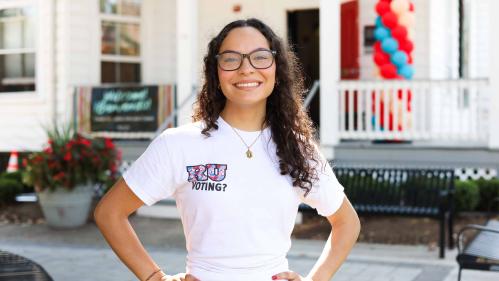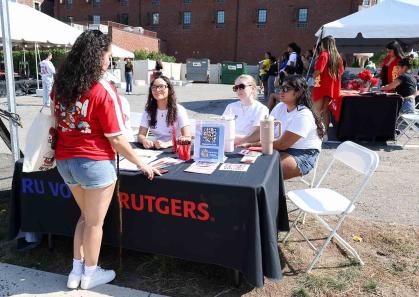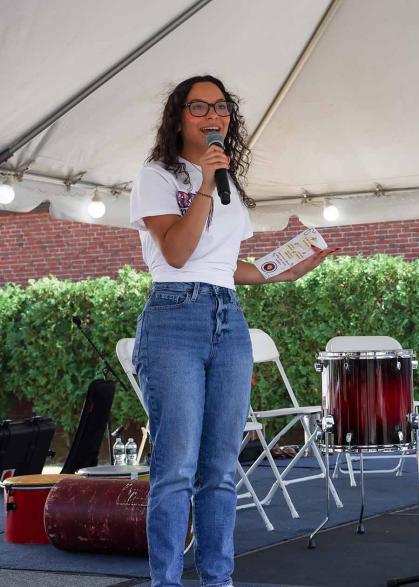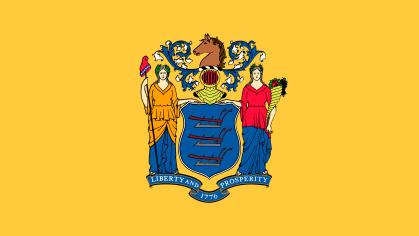Meet the Sophomore Who’s Inspiring Other Rutgers Students to Vote

Political science major Alejandra Afanador is an RU Voting Ambassador aiming to get the university's community registered ahead of the Nov. 5 election
“Get out the vote” is more than a catchphrase for Alejandra Afanador, a second-year student at Rutgers University–New Brunswick.
It’s the 19-year-old's mission on campus.
Afanador, an Honors College student, has spent the summer volunteering as an RU Voting Ambassador and will continue to do so ahead of the Tuesday, Nov. 5, general election.
A primary goal of the ambassador program, which is run by the Center for Youth Political Participation and the Eagleton Institute of Politics, is to encourage student voter registration and mobilization in the 2024 general election. Afanador and other ambassadors spent about 40 hours operating voter registration tables on campus during new student orientation sessions during the summer and will continue such efforts through much of the fall ahead of the Tuesday, Oct. 15, registration deadline.

“We're nonpartisan, so we don't tell people how to vote, but the main thing is we just want to get people civically engaged,” Afanador said. “We want to get students involved because of historically low turnout.”
Afanador – who said she’s “100 percent Latina” and that her mother is from Puerto Rico and her father is from Colombia – stressed the 18-29 age bracket of voters “is typically the lowest turnout when it comes to voting. And so, I think that civic education is very crucial – even just informing incoming students about, ‘Hey, you have the opportunity to register to vote.’”
According to the Pew Research Center, 10 percent of the electorate in 2022 were between the ages of 18 and 29.
Afanador, who attends the School of Arts and Sciences, is majoring in political science and minoring in philosophy, politics and economics. The Hasbrouck Heights, N.J., resident is on a pre-law track, with a particular interest in trial and international law.
Her interest in the legal field began percolating in middle school.
“I did this one project where we had the option of composing an opening statement, and it just really launched me into the legal realm,” said Afanador, adding that political science “is very well suited to the legal field because politics and law go hand in hand. They're very much kind of two sides of the same coin.”
Why is Afanador so passionate about voting?
“I've simply come to realize that there is such disillusionment in the government,” she said. “And this is across the political spectrum as well. No matter what stance people find themselves in, there is the all-too-normalized sentiment that politicians and the representatives who are meant to represent the people tend not to address the actual concerns of the electorate.”
As RU Voting Ambassadors, undergraduate or graduate-level volunteers take part in registration and engagement strategies to mobilize the Rutgers community to participate in the Nov. 5 general election. Ambassadors attend a training session and assist in a minimum of four voter registration or mobilization drives during the fall as well as promote and attend events hosted by the Center for Youth Political Participation and the Eagleton Institute.
“RU Voting Ambassadors play a vital role in equipping Rutgers students with the tools to vote and be engaged community members,” said Sophia Alexis, a graduate assistant at the Center for Youth Political Participation who added that ambassadors attended 20 new student orientation sessions over the summer and were present during move-In and “Welcome Week” programming. “I was impressed with Alejandra’s ability to help students understand the importance of engaging with politics, regardless of their background experiences.”
Ambassadors have helped more than 1,700 incoming students access voter registration and education resources, Alexis said.

“Young adults constitute a large portion of the eligible voting population, and their participation on Election Day will be consequential nationally but especially in swing states,” said Elizabeth C. Matto, a research professor and director of the Eagleton Institute. “Not only do young adults need to make a plan to vote, but campaigns and organizations need to put the effort into mobilizing this highly important segment of the electorate.”
During the spring semester, Afanador took a comparative politics class taught by William Field, a professor with the Department of Political Science. Field recalled bumping into the student at the Yard the morning of Rutgers Day and told her about what he and members of his department planned to do at their table.
“We decided to demonstrate ranked choice voting because there's a push to have it in New Jersey,” said Field, adding that Afanador volunteered to help on the spot.
“She was very helpful and very articulate in explaining to the people who were voting kind of how the process worked,” the professor said. “She came and joined us for the day without any prior reservation, conversation, appointments, whatever, just because she wants to jump in and be involved and help make a difference.”
Afanador’s sense of civic duty manifests in other efforts on campus. She is the secretary for the Latin American Student Organization, a political chair for the Latino Student Council, an editor of the Rutgers Undergraduate Law Review and a learning assistant in the Learning Assistant Program at Rutgers Learning Centers.
She also is the founding president of the Rutgers University chapter of BridgeUSA, a multipartisan student organization that “champions viewpoint diversity, responsible discourse and a solution-oriented political culture,” according to the group’s website.
Afanador said BridgeUSA “really was birthed out of seeing how polarized we are as a country, as a community, because in modern American politics, we find ourselves very backed into a corner or an echo chamber, especially with social media.”
Not only do young adults need to make a plan to vote, but campaigns and organizations need to put the effort into mobilizing this highly important segment of the electorate.
Elizabeth C. Matto
Director of the Eagleton Institute of Politics
She added, “Your feed is so catered to you. You think everyone thinks the same. And so, we become very polarized when it comes to the political spectrum. And because of that, we feel that we can't talk to each other ... if we have opposing views on anything. And so, in order to combat that polarization, BridgeUSA and its chapters are trying to provide a forum, a space for that ... because it's not a debate, it's not an argument. It's an open discussion.”
Afanador, who described herself as an avid reader and writer, said it’s important to register voters and encourage them to vote.
“There's this thing called the collective action problem,” she said. “It's basically saying like, ‘Oh, if you're in a group, you think that your personal efforts don't matter or that they don't have an impact.’ The notion that your personal effort is too small to influence the outcome, so why bother, which I think is definitely not the case. And, in turn, it actually ends up negatively affecting the group as a whole. Your voice does matter, and that's why you need to get out and actually voice it.”
RU Voting Ambassador efforts helped Rutgers–New Brunswick earn a bronze award from the ALL IN Campus Democracy Challenge, a national nonpartisan initiative of Civic Nation, for its democratic engagement to bolster student voter participation in the 2022 midterm elections.
Those interested in registering to vote or updating voter registration in New Jersey: All changes must be made by Oct. 15 to participate in the Nov. 5 election.




